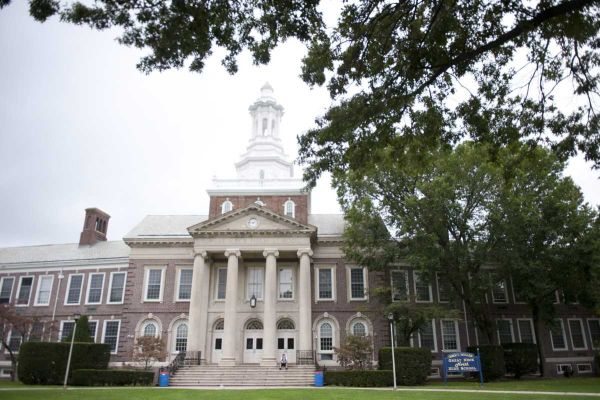Part 1 of a 2-part series on how local temples have come together to combat overdoses and the stigma of substance addiction
The opioid crisis is an epidemic that has devastated families and communities throughout Long Island and the entire country. In the past few months, four young people in the local Jewish community have tragically lost their lives to drug addiction and overdose.
Shaare Zion Synagogue hosted an educational event on Sunday, June 24, with a powerful and effective message: Substance abuse addiction is prevalent, but well hidden throughout our community—and help is available for individuals and families who are suffering.
The goals of the presentation were breaking the stigma, reaching out for help and helping others who are struggling.
The program was organized by Shaare Zion congregant Gigi Aharoni, along with the synagogue’s Sisterhood, with support from many Great Neck synagogues and groups including Temple Israel, Young Israel, Chabad, Great Neck Synagogue and Sephardic Heritage Alliance Inc. (SHAI). Along with religious leaders and trained counselors, Nassau County Narcotics and Vice Squad Detective Nicholas Stillman provided crucial information about how to address the problem and deliver effective treatment with the assistance of the police and courts. Nassau County Legislator Ellen Birnbaum and Town of North Hempstead Councilwoman Anna Kaplan also attended the event.
Rabbi Elbaz and Rabbi Yosef Lipsker spoke of the role of spirituality in dealing with life challenges, since a spiritual connection can help those who are struggling with addiction or are in recovery. The rabbis acknowledged that they personally counseled countless Jewish individuals and families who had substance abuse issues.
Religious leaders provide comfort and connection, without criticism to the addict or blaming the family. For many, there is a tendency to view these affected individuals as defective somehow, especially in cases of relapse. Lipsker spoke of the very high and predictable relapse rate for addicts. Just like with a diet, or smoking, relapse is a reality. Except in the case of drugs, especially opioids, a relapse can be lethal. If a relapse occurs, Lipsker provides guidance back to treatment.
Reducing Stigma Saves Lives
Substance abuse is a shameful secret in many families, but many would agree that the stigma is especially strong in the Jewish community, where family reputation is one of the most important aspects of daily life. Drug use and mental illness is seen as a weakness of character or morals, or even a failure of parenting or Jewish observance.

According to Rabbi Zvi Gluck of Amudim, who has led nearly 40 awareness events regarding this issue, stigma is one of the most difficult obstacles to combat the problem. He recently met with an Orthodox mother whose daughter was an addict.
“I wish my daughter had cancer,” she admitted. “If she had cancer, people would feel bad for her and for me. They would have compassion. They would show sympathy instead of blaming me.”
He spoke of another individual struggling with addiction who said, “If I go to rehab, no one will want to marry my children. But if I die of an overdose, it will be different. People will feel sorry for my children.”
Gluck spoke passionately in response to these compelling situations.
“I say to those parents and to everyone else, love your children regardless of their challenges,” said the rabbi. “Be open to them. Get them help. But, above all, love them.”
He emphasized that assigning blame to the individual or the family should not be the focus.
“The reason does not matter,” explained Gluck. “No one wakes up one day and decides to be an addict. Show support no matter what. Don’t look away.”
Gluck repeatedly acknowledged the reality of stigma in the Jewish community. He commended the honesty and bravery of those who admit to it, and those who overcome it to seek treatment.
“We must break the stigma,” he stressed. “We must support others who are struggling with substance abuse.”
He offered practical suggestions to be more supportive of those who are struggling, including adults who drink alcohol on Shabbat. Peer pressure is a reality for mature adults as well as teenagers.
“Don’t offer alcohol after kiddush to those who don’t want to partake,” Gluck said. “It is a sign of status to buy and consume expensive prestige brands of cognac. If someone refuses a sip, back off. Maybe they are trying to avoid alcohol. We should be more sensitive to those who are in treatment. Adults must drink responsibly. We must be mindful of the message that we are sending to children. Addiction is all around us, even if we don’t realize it. Even one death is too many.”
Find out how to get help in Part 2.
Kings Point resident Jacqueline Harounian, who recently earned a graduate degree in behavioral forensic psychology and is a trained victims advocate at The Safe Center, is a regular contributor to the Great Neck Record.




























